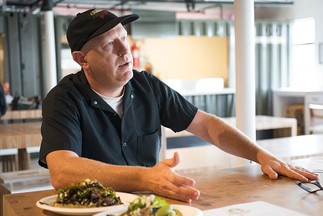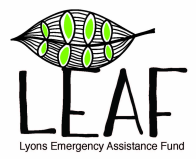 Chef Tim Payne may take his cooking inspiration from the Colorado soil, but the business model for his restaurant,Farmer Girl, is thoroughly modern. Payne started out with a food truck and catering company before signing a short-term lease in Avanti Food & Beverage, the restaurant incubator in LoHi, last summer; the idea was that the mini kitchens built from shipping containers inside Avanti were a great way to test a concept on a small scale before moving on to bigger things. And Payne is definitely moving on to bigger things: Farmer Girl Community Bistro at 432 Main Street in Lyons, which he opened earlier this year. Payne says he's one of the first Avanti tenants to use the system as intended, so he'll be relinquishing his spot to a new entrepreneur when his lease is up this summer. That's the way Avanti was designed, and the move is great for Payne, whose produce-forward menu at the Lyons eatery highlights several favorites from his Avanti kitchen. It's also great for customers of the food hall, who can look forward to a fresh slate of creative cooking from newcomers in 2016. (The leases at Avanti are staggered so that there won't be a complete turnover of tenants come July.) Farmer Girl opened in February in a homey space that had long been the Gateway Cafe and was more recently a sushi restaurant and then Local Eat + Drink. Payne included the word "community" in the name of his restaurant because 1 percent of sales will be donated to the Lyons Community Foundation. But his interest in the community doesn't end there. The chef's passion for Colorado-grown produce includes searching out short-season vegetables from farmers who may have the best spring peas or asparagus or herbs for only days or weeks. So a pesto that tops a carrot latke may be made with greenhouse basil one week and fresh, bright carrot tops the next. Most of the small plates, from chickpea fritters served with beet ketchup to butternut-squash hummus with housemade flatbread, are meatless, and a short roster of six entrees, which showcases Colorado beef, lamb and pork, also gives respect to veggies, with a hearty cassoulet chunky with winter squash, parsnips and mushrooms instead of the standard sausage and duck. Payne is already looking forward to warmer spring weather; he'll be replacing the restaurant's small front window with a large garage door to let in more light and air, and he'll soon launch weekend brunch. And keep an eye on the Farmer Girl website for a list of upcoming farm dinners this summer. The Avanti Farmer Girl may be ending its run, but between the Lyons eatery, the food truck and the catering business, Payne's farm-fresh fare is cropping up in more places than ever. Article appeared in the Westword: April 7, 2016 http://www.westword.com/restaurants/farmer-girl-community-bistro-in-lyons-springs-from-avanti-fast-casual-concept-7775849  Article Appeared in the Redstone Review April 2016 By Janaki Jane, Direct Services Advocate, LEAF In 2008, the then pastor of the Lyons Community Church, Claire McNulty Drewes, had the compelling idea of starting a food pantry and basic needs emergency fund. In her role as pastor, she had noticed that there were residents of Lyons who didn’t have enough to eat, and that sometimes local people ran into emergencies where they needed help with paying for basic needs like heat, electricity, rent and medical bills. McNulty Drewes went to her congregation, where members volunteered to help out in creating a food pantry and a Basic Needs Emergency Fund (BNEF). But she needed funding. So she went to the newly formed Lyons Community Foundation (LCF) and asked them for financial support. LCF responded. As a community foundation, its mission is to improve the quality of life, build a culture or giving, and encourage positive change in the Greater Lyons area. The organization has been dedicated to giving financial support to the basic needs programs in Lyons ever since. Between 2008 and 2016, including Rebuild Lyons Flood Recovery funds, LCF has granted BNEF and the Food Pantry, both of which are now LEAF, $209.069. “There are critical needs that aren’t optional needs,” said Clark Hodge, who was on the LCF Advisory Board for several years. “BNEF and the Food Pantry were granted money as a Board prerogative.” Other grants were part of a competitive process sent to a committee to fund or not. For those grants, “nobody was going to starve or have their heat turned off,” he said. “They’re important, too, but it’s different.” Funding for basic needs was seen as something separate and necessary. The programs could and can return to LCF for extra funding if they run out during the year. “There is an informal commitment to supporting BNEF/LEAF/Food Pantry,” said Monique Sawyer-Lang, current Chair of the LCF Advisory Board, and a co-chair of the Food Pantry since its inception. For the first few years, LCF funded the two programs with about $15,000-17,000 a year. “The Food Pantry started with 5 or 6 families getting prepacked boxes of non-perishable foods, as a ministry of the church,” said Sawyer-Lang. “The emergency part was very limited. For example, paying utilities when there was a catastrophic illness or a death in the family. But as time progressed, we could see that there was more need than we were able to meet.” They put in policies about how much each household could get in a year, and the number of times a year each household could get assistance. “It worked until the flood,” said Sawyer-Lang. In the aftermath of the floods, it was natural for LCF and BNEF to work together for flood relief. They created “Rebuild Lyons, One Life at a Time.” Lyons was fortunate to have the LCF—a trusted, philanthropic organization with 501(c)3 status—to be the stewards of all of the donations coming in to assist flood impacted Lyons residents. “The BNEF had the knowledge of the community and its needs,” said Sawyer-Lang. “LCF came up with an application and a confidential review process.” Because they were a local organization, they were able to move things along quickly and get out money in a more timely manner than larger organizations did. They distributed almost $1,000,000 to about 300 local families and households at around the New Year of 2014, less than 4 months after the floods. In helping with the recovery, it became apparent that there was a need for long term support in the community, which was bigger than BNEF could handle. In July 2014 LEAF was created as its own non-profit, including both the Lyons Community Food Pantry and basic needs assistance, and adding in Case Management. In the two years after the floods, LCF supported LEAF with $95,000 for flood recovery assistance. LEAF was able to hire a Displaced Resident Advocate to reach out to the former mobile home park residents, a flood rebuild advocate to assist Confluence residents with permitting, and to have a preliminary report on the options and possibilities of building a manufactured housing community in Lyons. During this time LEAF also assisted an unprecedented number of Lyons residents with needs, many of which would not even be considered in a non-disaster situation by a typical human services agency or family resource center. As LEAF has grown and expanded its programs and services to the community, LCF has remained steadfast in its support. Just recently, LCF granted LEAF $10,000 for operations and direct client assistance funds. LEAF is thus able to give financial assistance directly to area residents, and to provide information, resources, support and assistance that enable local residents to become more self-sufficient, which means that they and their families are healthier and happier members of our community, able to contribute from themselves more fully. “LCF’s support of LEAF’s work is truly making a difference in the lives of Lyons residents. Their commitment to the people of Lyons is astounding,” said Emily Dusel, Executive Director of LEAF. You can donate to LCF and support both LEAF and other local endeavors by going to their website www.lyonscf.org, and clicking on “donate.” LEAF is available for emergency basic needs assistance 7 days a week at 720-864-4309, and is open every Wednesday for Case Management, basic needs assistance, supportive advocacy, resource referral, along with the Lyons Community Food Pantry, every Wednesday between 10:30 and 5 at the Lyons Community Church, 350 Main Street, Lyons. www.leaflyons.org, or LEAF on Facebook. Janaki Jane is the Direct Services Advocate and Case Manager at LEAF. For the last 12 years, she has live off the grid in the foothills above Lyons, with her husband and her cat, being visited frequently by the local moose, bear, fox, bobcat, deer, elk and lion population.  Community Case Study Donating our products to nonprofit and civic organizations that are making their communities a better place is one of the most rewarding things we do. One of the many wonderful organizations we supported last year was the Lyons Community Foundation. Lyons is our neighbor to the north, and was devastated by flooding in 2013. While we always appreciate the opportunity to care for our nearby communities, we were especially honored to help those impacted by this catastrophic weather event. Created in 2008, the Lyons Community Foundation “exists to improve the quality of life, build a culture of giving, and encourage positive change in the Greater Lyons Area.” On June 17, 2015, they hosted their Hometown Hoedown, a family-friendly event that raised money for the LCF grant fund, which supports community projects such as health fairs, Meals on Wheels, local schools, and more. Nearly 250 attendees enjoyed a BBQ, games, square dancing, laser tag, panning for gold, hula hoops, a raffle, and other fun activities. The event brought in about $22,000, and thanks to donations such as ours, expenses were kept to a minimum. Over $17,000 in net proceeds went to the foundation to fund its important work. What makes this story even better is that the compostable GreenStripe products we donated allowed the Hoedown to prevent as much material as possible from going to the landfill. Eco-Cycle, a local non-profit dedicated to creating a zero waste world, hauled the food scraps and compostable packaging to Western Disposal, a local commercial composter. Western processed this organic material into valuable soil amendment that will be used to grow new vegetation. Had it gone to the landfill, these food scraps would have rotted and emitted methane, a potent greenhouse gas. No landfill + reduced emissions + healthy soil. Talk about a win-win-win. http://www.ecoproducts.com/community-case-study-16.html |
AuthorLyons Community Foundation Archives
October 2023
Categories |
Proudly powered by Weebly

 RSS Feed
RSS Feed